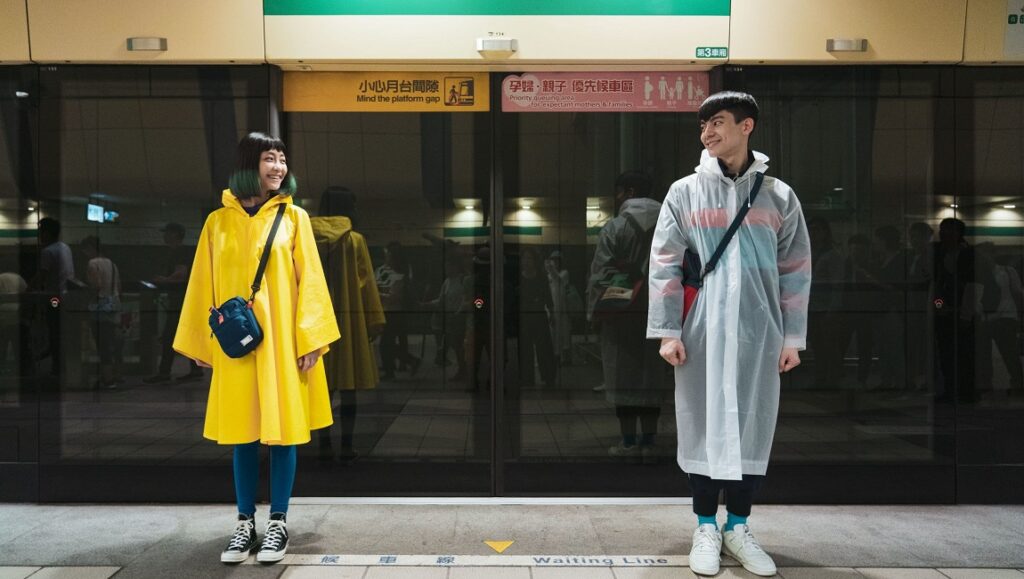Unleashed & Geran
Two very similar films in premise but vastly different in execution hit the festival this year. NYAFF is always a good home for Asian action films of all stripes and budgets, but rarely are two films so perfectly contrasted against each other in terms of both style and quality. From Hong Kong there’s Unleashed, from first-time director duo Ambrose and Ka Hei Kwok. Famed HK stuntman Ken Lo (part of Jackie Chan’s team for decades) stars as Debo, an ex-fighter who gave up the ring to teach in his own gym. His pupil, Fok Kit (Zhen Feng Sun), is an up-and-coming player on the underground fight circuit. Meanwhile the gym’s landlord is raising the rent, a mysterious and potentially deadly new fighter is brutally wiping out his challengers (with Fok Kit up next), and a pretty young actress has started training with Debo to both enhance her on-camera skill and perhaps inflict a little justice on a director who treated her very poorly. The surrogate family that forms here is certainly earnest and very sweet, and while something so narratively perfunctory isn’t really a problem in a simple fight movie, it has to be backed up with impressive technique. The fights here are simply inadequate, despite the presence of a force like Lo. Impacts are cut away from and elaborate movement is shot too-close or otherwise marred by excessive edits. It’s not enough to know that a fight is happening; the viewer needs to be able to see the performers perform, because martial arts is still acting. And the whole thing is shot with a chilly, blue, almost plastic video sheen. There’s no warmth — or rough edge — to any of it.
Contrast Unleashed with Geran, from prolific Malay cinematographer Areel Abu Bakar, also directing for the first time. Another family beset by gangsters and other unscrupulous hoods. This time Pal Nayan, his sister Fatimah, and their father Ali (Khoharullah Majid, Feiyna Tajudin, and Namron, respectively) find out their other wayward brother Mat Arip (Fad Anuar) has sold the deed to the family land to pay off his gambling debts from street racing. What the bad guys don’t know is that the family are all highly skilled practitioners of the martial art Silat. Hijinks ensue. Despite yet another simple, arguably even clichéd setup, Geran is extremely confident, unreconstructed martial arts filmmaking on a DIY level. At times, it’s enough to even recall the great master director Lau Kar-leung in that the fight craft of its characters is a spiritual extension of its practitioners. Here that leads to a slightly schmaltzy morality that is nevertheless charming and effective. And the performers themselves are, in real life, experienced in Silat, so Abu Bakar is able to use camera movement and cuts to emphasize speed rather than create the illusion of it. Tajudin is particularly stunning as the no-bullshit sister who fights off a bunch of dudes while keeping her hijab perfectly in place. There’s also a fairly colorful depiction of Malay gang culture and street racing.
Where Unleashed evinced a polished plasticity, Geran is raw, brown, cheap video, often slipping into Go-Pro footage for odd angles or tough car shots. In other words, it’s constantly teetering on an edge visually. Put next to each other, these two films feel like polar opposites despite building from essentially the same stories. The contrast works as a stark object lesson in filmcraft: while cursory themes are shared — grappling with simple ideas like legacy and skill and power and family — it’s the gap that is revealed between execution and intent that most defines these films. In the case of Geran, that personality goes a long way. Matt Lynch
Rom
New Vietnamese film Rom has garnered comparisons to both Run Lola Run and Slumdog Millionaire, though it shares neither the gimmicky structure of either nor the icky colonialist underpinnings of the latter. But it is an absolutely propulsive narrative feature, a perpetual motion machine of characters constantly running — either to meet deadlines and deliver cash, or away from cops, gangsters, and dissatisfied customers — but inevitably crashing into a wall of poverty. Writer/director Tran Thanh Huy follows young Rom (an incredible Tran Anh Khoa) as he darts around the slums of Ho Chi Minh City (formerly Saigon) like a rocket, collecting numbers in an elaborate, and highly illegal, underground lottery system. Huy breathlessly details this scheme, with Rom and fellow courier Phuc (Nguyen Phan Anh Tu) always hustling, the details of which include convincing people to play in the first place and then “selling” them numbers before collecting what amounts to a commission if the number hits. It’s fiercely competitive, with Rom and Phuc alternating between reluctant camaraderie and increasingly violent fist fights. There’s an almost documentary feel to these early scenes, as Huy lays out all the players and the various ways in which they intersect, with a playful voiceover from Rom setting the scene.
But what begins as a lighthearted romp, a kind of lost boys adventure, eventually becomes something much darker as characters become desperate for money. Thankfully, Huy avoids the instinct to wallow in misery. Every character is afforded their own slivers of humanity and, in moments of reprieve, even celebration when someone’s number comes in. But this is a tenuous existence; there is the pervading sense that this house of cards could crumble at any moment. Customers take out high interest loans using their homes as collateral, eventually running into trouble with loan sharks, while Rom goes to extreme measures to conjure up numbers and make enough money to track down his absentee parents. There’s no schmaltzy humanism here, just an acknowledgement of the transactional nature of capitalism, where pursuit of money ultimately trumps human decency. It’s a stunning film, in turns funny and heartbreaking, with an abrupt, opaque ending that suggests that some people, these people, will never be able to stop running. Daniel Gorman
John Denver Trending
It’s not much of a surprise to discover that John Denver Trending is the feature debut of writer-director Arden Rod Condez. Given the opportunity to play in the big leagues, it feels as though Condez seized the opportunity to inelegantly amass every thought that passed through his head on any number of subjects, from internet bullying culture to the current state of political and socioeconomic affairs in his home country of The Philippines, where the film is also set. It follows, then, that John Denver Trending is an ambitious affair, but also entirely overstuffed, to the point that it loses anything resembling focus or cogency. Still, there’s a certain innate pleasure to watching a filmmaker swing for the fences rather than play it safe, and in that respect, Condez’s film certainly holds appeal.
In telling the tale of the titular 14-year-old boy, who is caught on video beating a fellow student for a wrongful accusation of theft, Condez renders The Philippines as a country caught between the past and the present. Elder generations discuss spells and curses, consulting “witch doctors” to enact revenge, while the younger generation lives its life through phone screens and social media posts, where vengeance is just a click away. Run-down houses and schools dot the beaten landscape, the juxtaposition of nature and technology symbolizing a country in search of a contemporaneous identity. Police officers use oppression and intimidation in an effort to obtain “the truth,” while accused parties remain guilty until proven innocent. Meanwhile, a penniless young boy with a name as American as apple pie acts as cipher for the audience, a mere pawn in a game enacted by a capitalistic hierarchy that pits the lower class against one another to distract and destroy.
John Denver Trending works best in its quietest moments, simply capturing the hardscrabble, quotidian details of its characters’ lives. The film’s naturalism feels authentic and lived-in, and the non-professional actors work in concert to further convey this sense of realism. Condez’s imagistic instincts likewise support the film’s minor key strengths, and he would have been wise to trust these aesthetic choices, which reliably communicate more than his over-busy, heavy-handed script. The ending is especially perplexing, a mixture of melodrama and cynicism that feels wholly unearned, existing seemingly only for shock value. An informational card that pops up immediately after the film’s close pushes the entire enterprise into something bordering on the reprehensible, forcing viewers to reevaluate Condez’s true intent, and likely leaving only a sense of utter bewilderment. Condez would do well to heed a bit of idiomatic advice from the internet generation he seems to despise so much: pick a lane. Steven Warner
I WeirDo
In its first half, Liao Ming-yi‘s debut feature, I WeirDo, fits the mode of the cute, quirky rom-com. It bears down hard on its appropriately oddball flourishes: the strange typography of its English title; the bright, candy-colored cinematography, often resembling an exploding bag of Skittles (the digital images are given an extra pop by being shot entirely with iPhones); a decidedly unique take on the familiar, requisite montages of romance flowering. But the love story in I WeirDo has a bit of an unusual hook — the central couple both suffer from the same mental illness, specifically obsessive-compulsive disorder. We are first introduced to Chen Po-ching (Austin Lin), whose condition has him mostly confined to his home, constantly washing his hands and sanitizing every corner of his pristinely ordered dwelling. He ventures outside only once a month, precisely on the 15th, to meet with his doctor and to pick up food and household disinfectants from the local supermarket. During these outings, he diligently insulates himself from any dreaded germs by wearing a face mask, gloves, and protective rain gear. Coming back home on the subway one day, he spots Chen Ching (Nikki Hsieh), a young woman outfitted exactly like him. Po-ching breaks his routine to surreptitiously follow her to another supermarket, where he observes a particular manifestation of her OCD, which partly involves compulsive shoplifting chocolate candies. It’s not long before they discover each other, and they quickly enter into a relationship, bonding over their shared disorder.
I WeirDo was shot before the current, ongoing pandemic, but it goes without saying that the image of the mostly homebound Po-ching and Ching donning their PPE uniforms lands much differently now than it would were we not living in such times. It’s a fascinating development, perceiving the film according to two different moments: in conception, these two individuals are both defined by their outcast status, and couple up perhaps because of that shared societal position; in execution, viewed from 2020’s vantage, the duo could otherwise simply represent the prudence and caution of our new normal. (In that way, it’s perhaps the most organic realization of quarantine cinema yet precisely because of its incidental nature, in contrast to the number of intentional, micro-budget creations that have been shot and released over the past several months.) In keeping with the more somber connotations with which the current global malady imbues the film, at its midpoint the “com” is largely jettisoned when a change occurs in one character’s condition, upending the couple’s blissful equilibrium and erupting the cozy cocoon they’ve weaved around themselves. And so, an enjoyable but slight scenario quickly transforms into a poignant examination of relationship power dynamics and compatibility, while also questioning our cultural constructions of “normal.” The result is a film far richer than its initial eccentricities suggest: a haunting and melancholy experience, powerful in its own right, and further vitalized by a unique relation to its time of arrival. Christopher Bourne
— [Originally published as part of InRO’s 2020 Fantasia Fest coverage.]




Comments are closed.